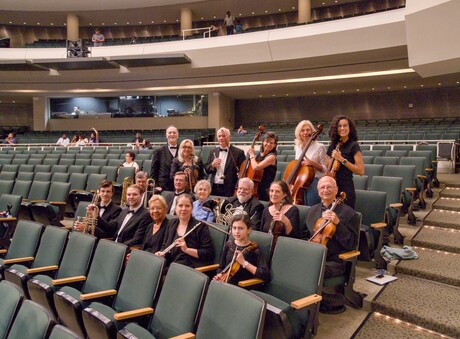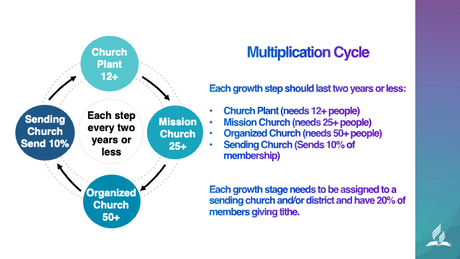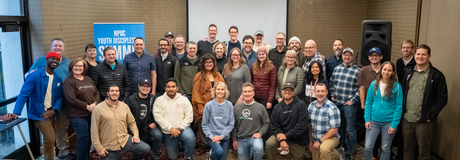There is a rising trend among the youth of today, especially seen among “Generation Z-ers.” They experience despair, depression and more suicide than in previous generations. The future is seen as bleak and without hope. And when one tries to speak optimistically, the resulting skepticism runs deep.
How are we to share hope with them?
True hope for mankind comes from the Biblical narrative. And that narrative starts with an act of creation by a loving and powerful God. And yet much of the modern science of today would promote origins apart from that Creator. Instead, our beginnings are assumed to lie in some bubbling chemical pool where atoms accidently came together to form life. From that lifeform, a long series of fortunate mistakes in reproduction caused life to change into a myriad of delightful creatures — hummingbirds, whales, puppies and people. And all of these complex forms came to be by pushing against the law of physics called “entropy.” Nature currently is moving steadily away in an opposite direction, from organization to disorganization.
This model for origins is the only theory permitted to be taught in public schools and is the only model presented to the public via media like movies and science programs. Alternate views involving the Bible are ignored and because of this, science-supported creation is becoming less known.
Recent Gallup polls taken in America regarding origins show a reduction among people’s knowledge of creationism. From 2007 to 2017 those very familiar with creationism went from 50% down to 36%. The science supporting the Designer God is plentiful, but fewer and fewer people know about it. Isn’t this where the Seventh-day Adventist message from Revelation 14 can bring light?
The General Conference has appointed one Sabbath every year as “Creation Sabbath.” The purpose is to emphasize doctrines of creation and the Sabbath with special programming, especially for the public. The third Sabbath of October is the annual designated day, which this year fell on October 16.
Since our denomination’s birth we have seen, as our corporate mission, the proclamation of Revelation 14’s Three Angels Messages. Set in a last days’ invitation to reconciliation with our loving Creator, the phrasing includes references to the Sabbath (“heaven, earth and seas”) as well as to the flood of Genesis (“fountains of waters”). It is, in fact, a call to worship the God of Genesis, where He is revealed as both Creator and Judge. And since Revelation 14 concludes with images of a harvest, there is a tangible sense of urgency to this message.
But such a message loses much of its impact if the Book of Genesis is thought to be non-historical; that is, if it is seen to be essentially fairy tales. Where did that view enter into Western thought?
During the rise of the “Age of Reason” in the late 1700s, skepticism in the Bible and most things of supernatural origin led to an effort to understand nature apart from any stories of origin (like Genesis). In the wake of this movement, “methodological naturalism” became the norm in understanding nature. That is, all conclusions must not ever include God in the picture. This humanistic approach has affected academic disciplines in higher education, especially in today's science. But with the resulting skepticism of the hope we share in a future with God, purposelessness remains as a tangible cloud over humanity.
So how can we share our hope?
Never underestimate the power of hope! In 1 Corinthians 13 it is part of the “heavenly triumvirate” of “faith, hope and love.” If life has no ultimate purpose, personal hope for a better future is gone. That’s why convincing people there are solid reasons to believe Genesis is reliable, through science and history, will open the door to other truths.
Proving the historicity of the flood is one way to start sharing. For instance, virtually every ancient tribal group, from the Middle East, Africa, Asia, Europe and the Americas remember a universal flood story. Though details differ, there are remarkable similarities, including a Noahic character escaping the waters and beginning the repopulation of earth. There are no similar memories of a great fire or earthquake or other natural disaster — just a world-destroying deluge. As a Native American tour guide once said in the Smithsonian’s Native American Museum, “perhaps there’s something to it!”
[Insert picture #1 of flood stories list]
Proof from geology is also compelling. A full 75% of all rocks are sedimentary in composition, generally requiring water in its manufacture. The Grand Canyon is almost entirely composed of sedimentary rock, which is easiest to explain using a flood model. There is currently no place on earth where comparable, huge flat layers of rock are being deposited one on top of the other. Creationists spend time proving the flood origins of the earth’s crust; the hope is, if people are led to believe that the flood of Genesis happened, they might also believe the rest of Genesis is historical as well.
[Insert picture #2 of sedimentary rock layers]
Yet another powerful area of proof lies in the fossil record itself. As Harvard biologist and evolutionist Stephen Jay Gould admitted, “The extreme rarity of transitional forms in the fossil record persists as the trade secret of paleontology. The evolutionary trees that adorn our textbooks have data only at the tips and nodes of their branches; the rest is inference ... not the evidence of fossils.” This is the old, yet still strong argument of “missing links.” Fossils are clearly absent where intermediate stages of development in the fossil record should be plentiful.
[Insert picture #3 of evolution’s tree of life — green circles showing fossil evidence, red ones showing their absence]
As for evolution itself, a scientific theory of origins is heavily influenced by humanistic reasoning. But more scientists are questioning its current standing among biologists. For instance, the mechanism driving evolution is unknown. Darwin’s theory of such a mechanism called “survival of the fittest” has long been abandoned, because it involves no genetic altering. It merely produces very fit animals! It doesn’t change them.
The more current view is called “Neo-Darwinism” and it assumes mutations or mistakes in reproduction can account for change. However, in repeated laboratory experimentation, mutations virtually always result in a defect that includes loss of functions. It rarely or never results in an enhancement. Scientists are now looking for another theory where no God is involved, but one where succeeding organisms would tend to be more complex than their ancestors. So far, no theory has gained traction.
At some internal level, we think that God has “hardwired” us to believe in larger pictures. “He has made everything beautiful in its time. Also, He has put eternity in their hearts, except that no one can find out the work that God does from beginning to end” (Ecclesiastes 3:11).
God has made humankind with “eternity” in their hearts, but left them without the ability the completely comprehend all of His works. We believe that means the desire to know God and greater realities than our visible world is present within us — by intentional design. But we lack the ability or capacity to understand our universe completely.
It also means people have a natural tendency to believe they were created for a higher purpose. It is to that natural tendency that our appeals will resonate. People long for a story where there is a happy ending and that is precisely the story the Bible offers.
But a rising trend in America is the hostility and energy we see in people making serious cases for their positions, directly challenging others with a spirit that rarely resembles a God of love. As a result, people tend to harden their defenses when challenged.
What is needed is another spirit, one that does not merely proclaim, “I am right and you are wrong.”
People often ask for that one “best argument” about God's existence — an argument that is unarguable.
Consider that what works best with today’s youth is honest and genuine personal stories. Young people tend to respect one’s personal journey. Share what the Creator God has done in your life and how a knowledge of Him and His works has blessed you. At some point you can show that you don’t have to sacrifice evidence-based reasoning to believe — that time will likely come later.









